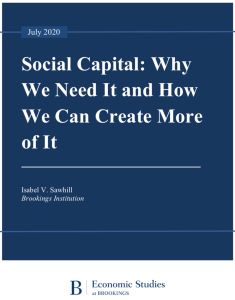Join getAbstract to access the summary!

Join getAbstract to access the summary!
Isabel V. Sawhill
Social Capital
Why We Need It and How We Can Create More
Brookings Institution, 2020
What's inside?
Investing in community institutions help them build “social capital” – fundamental to a healthy society.
Recommendation
“Social capital” is the societal good will that accumulates among people within communities. It’s often built on family, school and faith-based associations. When social trust erodes, so does people’s faith in democracy. Brookings Institution Senior Fellow Isabel V. Sawhill explores social capital, where it exists and how it sometimes goes wrong. She does not view social capital as a good unto itself, but recognizes it as a powerful force when paired with inclusive, ethical governance. Sawhill offers policy solutions for rebuilding community trust and trust in government.
Summary
About the Author
Isabel V. Sawhill works as a Brookings Institution senior fellow at the Center on Children and Families and the Future of the Middle Class Initiative.


















Comment on this summary